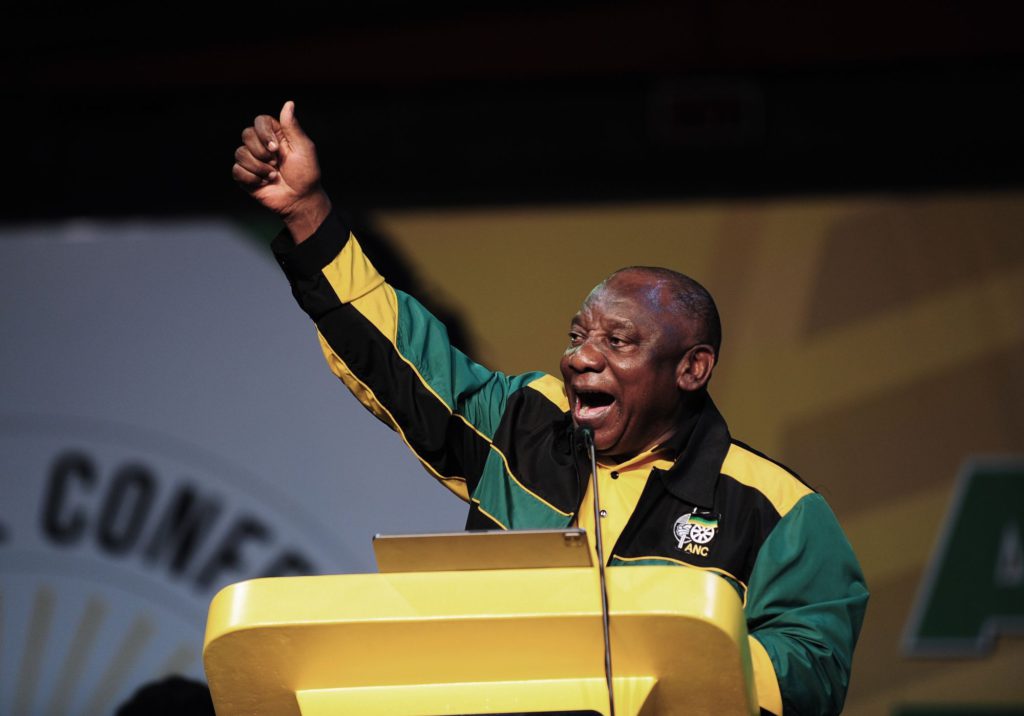South African President Cyril Ramaphosa notched up another win in the leadership contest for the ruling African National Congress, after his allies secured a resounding majority of posts on the party’s top decision-making structure.
(Bloomberg) — South African President Cyril Ramaphosa notched up another win in the leadership contest for the ruling African National Congress, after his allies secured a resounding majority of posts on the party’s top decision-making structure.
At least 65% of 80 additional members of the ANC’s National Executive Committee, who were elected at its Dec. 16-20 national conference, appeared on a list of preferred candidates that was drafted by the president’s camp and seen by Bloomberg News. They include Finance Minister Enoch Godongwana, Minister in the Presidency Mondli Gungubele, Justice Minister Ronald Lamola and Minister of Public Service and Administration Senzo Mchunu.
Ramaphosa comfortably won a second term as ANC leader at the conference, while his backers secured four of the other top six positions, and the composition of the remainder of the NEC further tilts the balance of power in his favor. That’s a marked turnaround from 2017, when the party leadership was more-or-less evenly split between his supporters and adversaries, some of whom were loosely aligned to his predecessor Jacob Zuma.
The shift could make it easier for Ramaphosa to pursue reforms needed to bolster economic growth and give him more freedom to make changes to his cabinet. He’s also likely to get more political cover against attacks over his handling of the theft of foreign currency that had been stuffed into a sofa at his game farm — a scandal that almost led to impeachment proceedings.
“It’s a pro-Cyril NEC,” Ongama Mtimka, a political analyst at Nelson Mandela University in the southern city of Gqeberha, said by phone on Wednesday. “He has consolidated his power, both at the level of the top seven and the NEC and that bodes well for the agendas that he wants to pursue.”
It won’t be all plain sailing for Ramaphosa, with some of his rivals also making it onto the NEC. Among them is Zweli Mkhize, who stood against the president for the top ANC post, Cooperative Governance Minister Nkosazana Dlamini-Zuma, who voted with the opposition in favor of him being subjected to an impeachment inquiry and Tourism Minister Lindiwe Sisulu, who has repeatedly challenged his authority.
The outcome of the elections also dealt a blow to Ramaphosa’s attempts to clean up the party, which has been struggling to rebuild its reputation after Zuma’s scandal-marred tenure. Several people who’ve been implicated in wrongdoing secured election to its top leadership.
They include ANC Chairman Gwede Mantashe, Nomvula Mokonyane, the party’s first deputy secretary-general, Zizi Kodwa, a deputy minister in the presidency, Faith Muthambi,a former communications minister, and Malusi Gigaba, a former finance minister. A judicial commission of inquiry that spent four years investigating state graft implicated the five officials in taking bribes and other crimes and recommended that law enforcement agencies conduct further investigations to see if they should be criminally charged. They all deny wrongdoing.
Others with questionable reputations who made the cut are:
- Bathabile Dlamini, a former welfare minister and head of the ANC’s womens’ league, who was sentenced to a fine or four years in prison after she was found to have lied under oath while testifying at a Constitutional Court inquiry into a crisis over welfare-grant payments.
- Andile Lungisa, who served as an ANC municipal councilor and served a prison sentence for smashing a water jug over an opposition councilor’s head.
- Mduduzi Manana, who quit as deputy education minister and handed himself in to police, after being accused of assaulting a woman at a Johannesburg restaurant. He was convicted and ordered to pay a fine or serve a year in jail.
All the NEC’s members had the right to stand for election and disciplinary processes against those accused of wrongdoing will run their course, Fikile Mbalula, the party’s new secretary-general, told reporters on Wednesday.
Senior members of the South African Communist Party and the Congress of South African Trade Unions, which have been part of the country’s ruling alliance since the end of White-minority rule, lost their places on the NEC — an indication of the increasingly strained relations they have with the ANC.
Others who either failed to win re-election or didn’t stand were Deputy President David Mabuza, Public Enterprises Minister Pravin Gordhan, ex-Finance Minister Tito Mboweni and Nosiviwe Mapisa-Nqakula, the speaker of parliament.
Mtimka sees Ramaphosa as being able to keep his detractors under control.
“He’s not going to be brought down by a political stalemate within the party,” he said. “He has been unleashed politically to be able to fashion the NEC in his own image, as has been the case with all other presidents before him.”
–With assistance from Paul Vecchiatto and John Bowker.
(Updates with comments from ANC secretary-general in first paragraph below bullet points.)
More stories like this are available on bloomberg.com
©2022 Bloomberg L.P.










